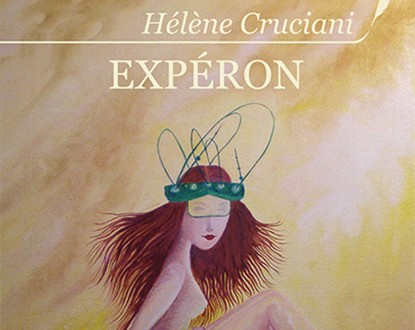The first novel published by Griffe d’Encre, “Expéron” by Hélène Cruciani, is a social anticipation book, touching and comprehensive, which both fascinates and frightens.

Annabelle, in her forties, does not possess this important key. Her desire for a child takes precedence over everything, and her husband Andy, a neurology specialist, is not really concerned with her situation. For the past few days, he has been fascinated by a young boy, Ange, who at 10 years old still does not speak. Convinced that little Ange is gifted but simply sensitive to another form of communication, Andy decides to test the Expéron on him.
But Annabelle is on the verge of breaking down…
In this novel, it’s not just about neurology, genetics or new technologies that allow people to gain experience through direct brain projection (the Expéron). It’s much more than that. It’s a meticulous and wonderful description of a future that seems very near. A future where everything would be extremely controlled and where freedom would have almost disappeared. Hélène Cruciani is equally focused on describing and bringing this world to life as she is on showing its inevitable consequences. I am particularly referring to the overuse of genetics that allows one to visualize their child up to adulthood in fast forward, which Jessica, Annabelle’s best friend, experiences negatively.
Expéron does not confine itself to science fiction; all themes are addressed: social pressure, motherhood, the desire for children, male/female relationships in this new society, the flaws of humans that emerge despite science, despite the refinement of research, of results. The natural that reasserts itself.
It is a very well-written novel, with a nuanced, very feminine pen. The scientific aspect is really well simplified, we understand, we grasp the complexity of things but are not overwhelmed, and it is not necessary to re-read the page two or three times to understand. And this is really crucial in an anticipation novel, to be able to immerse oneself completely in the story.
We get attached to Annabelle as much as to Andy, even though it is clear to the reader that he is making mistakes. The characters are well-developed, researched, genuine. They are the protagonists of a novel, yet they are common, their past fractures sometimes emerge depending on the circumstances.
The story is gripping, we follow Annabelle in her escape, Andy in his work, his fight for Ange, the unforeseen events of the Expéron that will upheave the experiment. In short, we want to know, we hope for a happy ending, and as a result, we devour the pages, and the chapters fly by.
A surprising, feminine novel that offers a glimpse of what our world could become. New aberrations, like having a child without the AAE and without genetic assistance… An incredible projection of our future society, ultra-controlled, inevitably leading to frustrations and transgressions. Expéron is an interesting novel for many reasons, intelligent, and the immersion in 2054 is complete.



